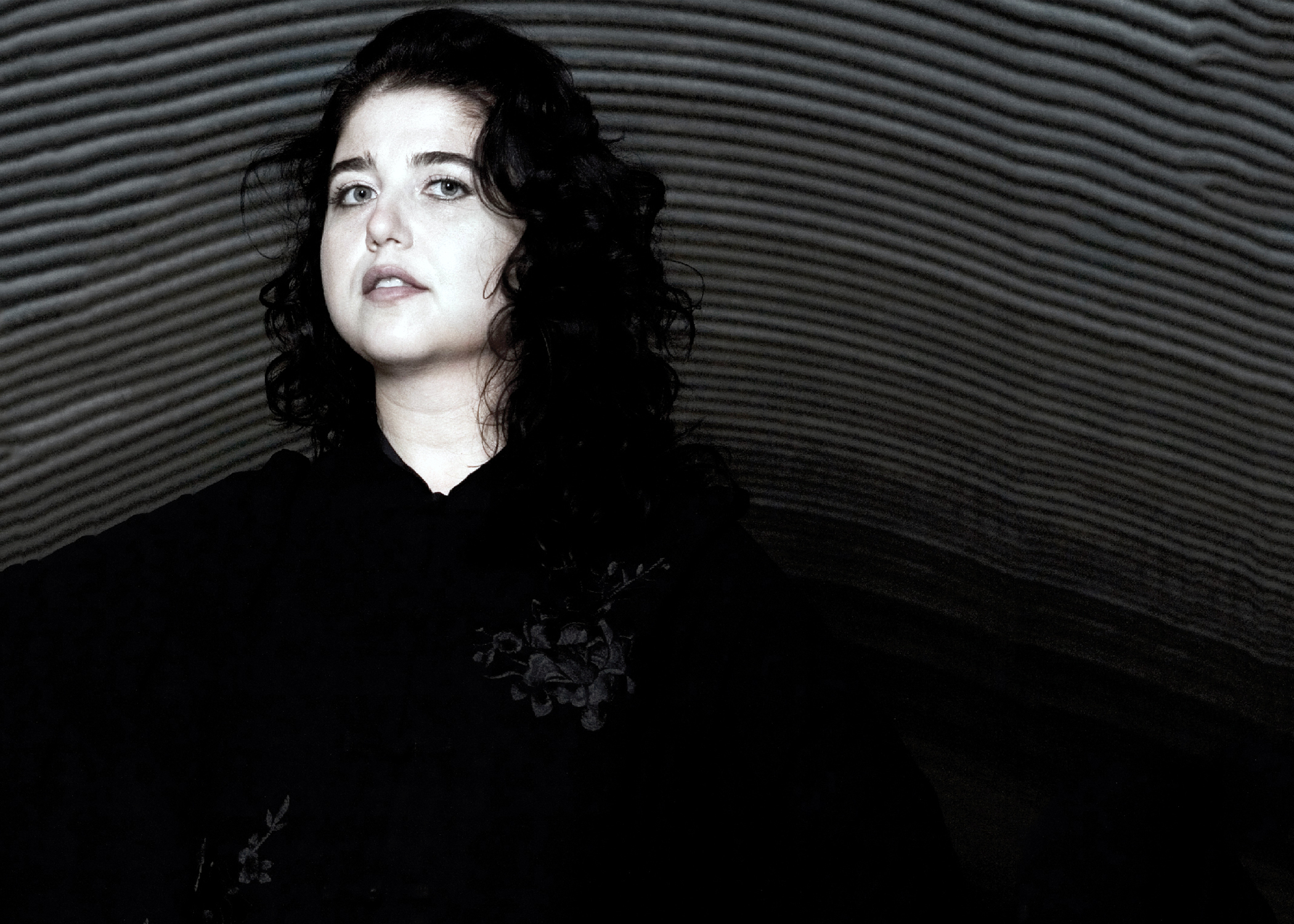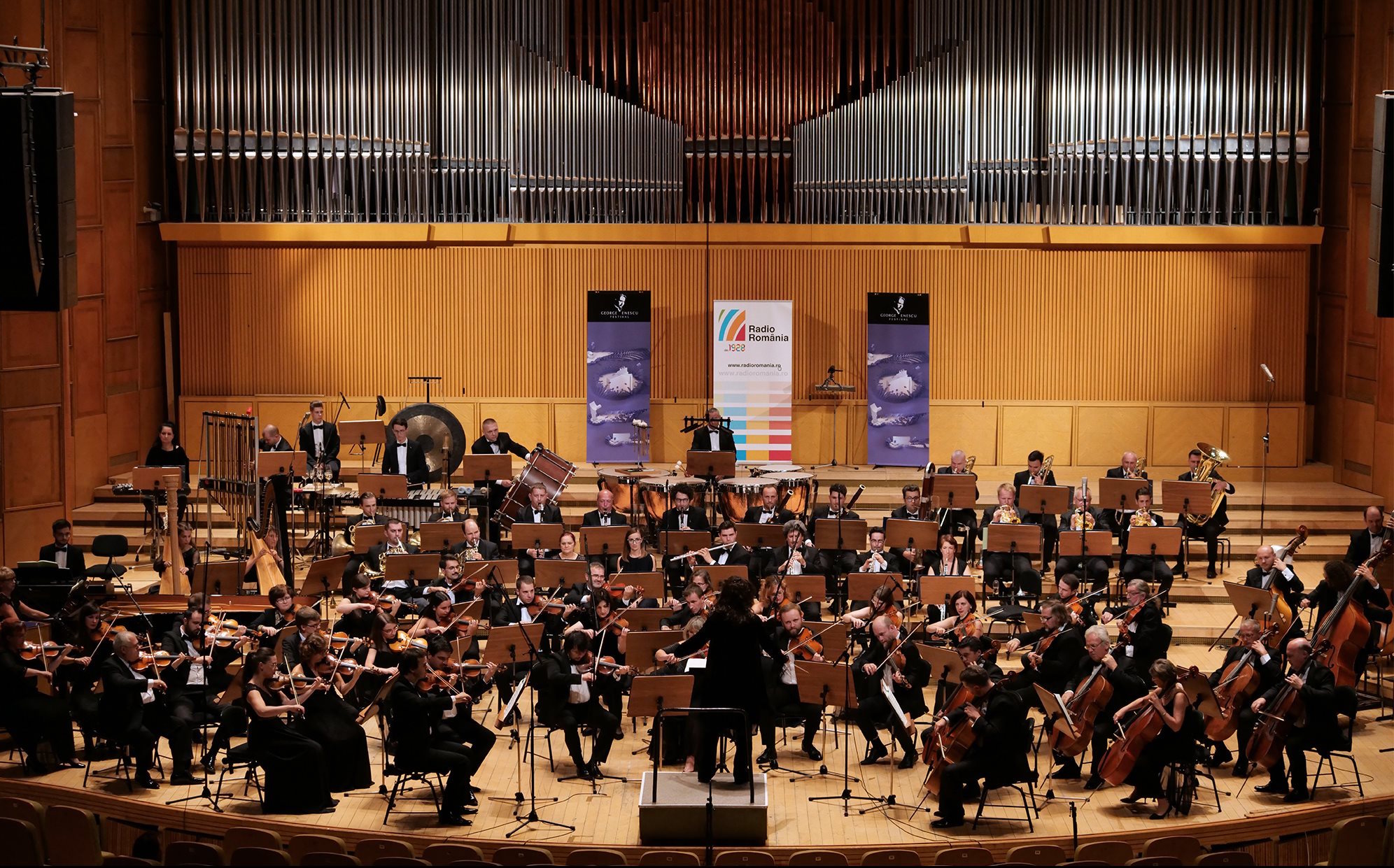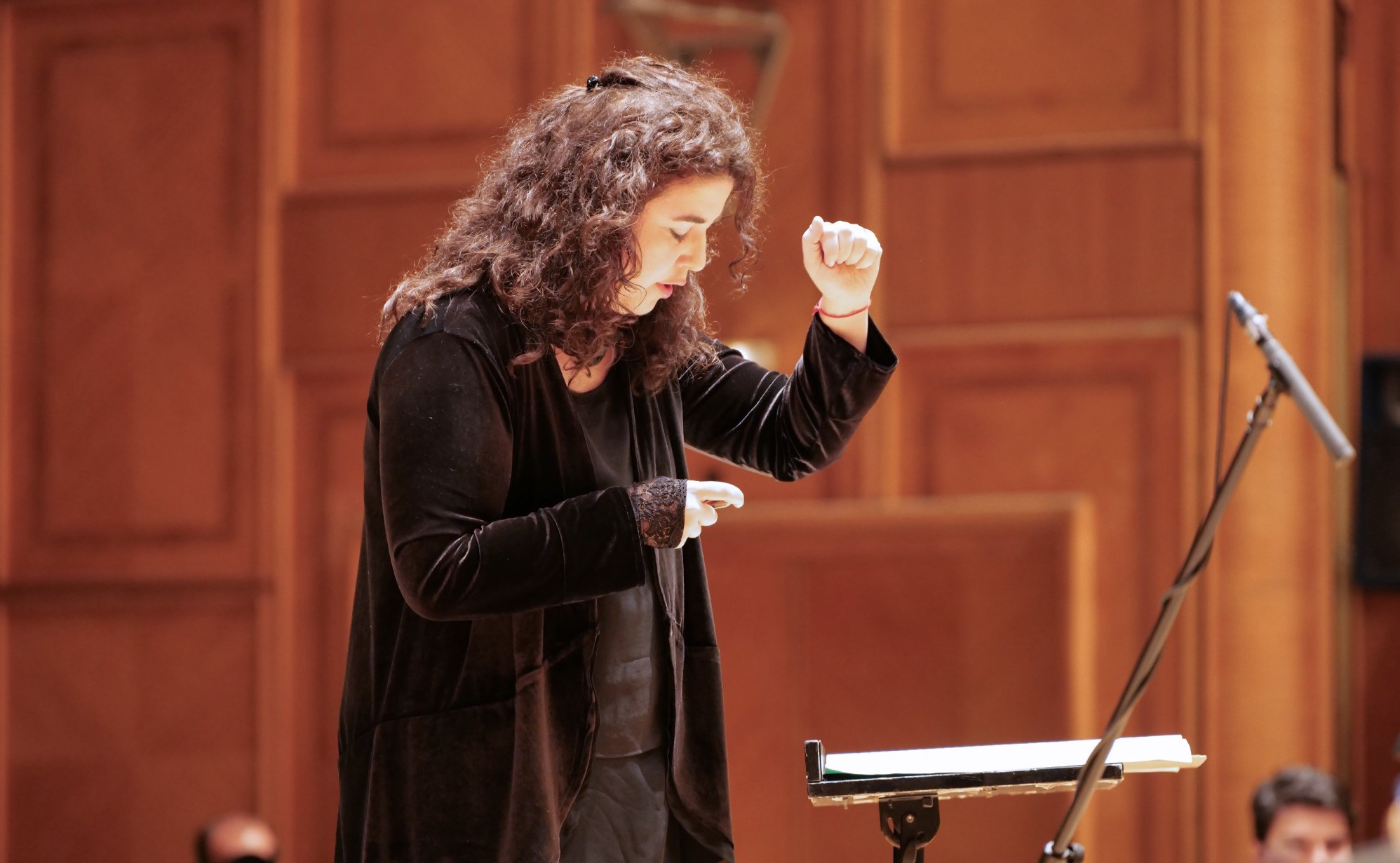
Photo: N. Feller
Lera Auerbach is inspiring, and at first glance, more than a little intimidating.
A multi-talented artist, the Russian-born, US-based artist has a range of creative talents: she paints, she writes poetry, she conducts, she is a pianist and a composer. Auerbach’s relentless creative expression is epic in its scope but equally intimate in its manifestation. Gramophone’s Stephen Mudge has rightly observed that “(h)er texts have a universal dimension, rejecting religious dogma in favour of global spirituality” and though written in relation to Auerbach’s awesome, overwhelming Requiem (Dresden: An Ode to Peace), premiered in February 2012 (on the occasion of remembrance of Dresden’s destruction on February 13, 1945), it’s a feeling well applicable to large swaths of her oeuvre. Her works feel incredibly personal, as if one is peaking into a diary, and yet call to mind a very cosmic, broad sense of universal human experience. Her output includes chamber music, symphonies, requiems, concertos, solo piano work, and operas, and she’s worked with a range of gifted artists, including violinists Leonidas Kavakos, Hilary Hahn, Daniel Hope, Julian Rachlin, cellists Alisa Weilerstein, Gautier Capuçon, choreographer John Neumeier (with whom she has created three ballets), and organizations like Theater an der Wien (Vienna), Staatsoper Hamburg, Lincoln Center, Nuremberg State Theater, Stanislavsky and Nemirovich-Danchenko Moscow Academic Music Theatre, the Netherlands Dance Theatre, San Francisco Ballet, and the National Ballet of Canada.
The aforementioned Ode to Peace, written when she was composer-in-residence with the Staatskapelle Dresden, incorporates forty language and integrates elements of Christianity, Judaism, Hinduism, Buddhism and Islam. Its final movement is based on the famous “Dresden Amen” (a sequence of six notes sung by choirs during religious services in since the early 1800s), a pattern used by Bruckner and Wagner as well, which the composer herself sets in six prayers within the framework of a large fugue. She told Opera News in 2014 that “when you face the abyss, that’s when your true self emerges.” Along with Dresden, Auerbach has been composer-in-residence with São Paulo Symphony, Orchestra Ensemble Kanazawa, Concerto Budapest Symphony Orchestra, MusikFest Bremen, and Norway’s Trondheim Chamber Music Festival, which, as you’ll read, hosted a deeply memorable experience of her acapella opera, The Blind. Written in 1994 when Auerbach was a student at the Aspen Music Festival, it received its premiere in 2011 in Berlin, and was subsequently staged in New York in 2013 as part of the Lincoln Center Festival. Based on a play by Maurice Maeterlinck (the man behind Pelléas et Mélisande), Auerbach’s opera necessitates its audience members being blindfolded for its one-hour duration. The work is a good example of the kind of fearlessness with which Auerbach approaches her work, and the fearlessness she hopes audiences bring, or at least, a quality she, as a creator, hopes to inspire.
The all-piano album Preludes And Dreams (2006, BIS Records) is equally fearless in terms of scope, virtuosity and emotional weight, and is a particular favorite of mine. With its haunting blend of classical (snatches of Beethoven’s Fifth are clearly discernible in some passages), Russian (Prokofiev, Mussorgsky, and Shostakovich), and early 20th century sounds (notably Kurt Weill as well as Schoenberg), it is at once melodic, dissonant, lyrical, and jarring, Auerbach writes (and performs) gripping combinations of eerie chords and sweeping, symphonic runs. The album is a good example of her approach: take her or leave her, but you cannot forget the forcefulness of her expressivity. As has been rightly noted, she “isn’t trying to do a backflip in order to please an audience.”
Exploring the sheer volume of her work the last few months left me feeling a little daunted at the prospect of meeting her at this year’s edition of the George Enescu Festival in Bucharest, where she led a concert of her works with the Transylvania Philharmonic Orchestra. As it turns out, I had little to fear. In person, Auerbach is engaging, charming, and very intense conversationally; she looks right into one’s eyes as she comfortably offers waterfalls of personal insights and thoughtful observations. With strong opinions on audiences, expectations, and engagement, Auerbach’s combination of committed artistry and earthy personality mean she’s constantly in demand: she’s currently in the U.S. with stops in California, Iowa, and New York, returns to Europe mid-month for performances in Germany and Belgium, then returns again to the US, and then again back to Europe. It was a blessing to catch her between gigs in her busy, buzzy creative life, and certainly offered a whole new way into the art of an immensely fascinating figure in contemporary music and art. Confident, yes; intimidating, no. Excelsior, Lera.

Lera Auerbach leads the Transylvania Philharmonic Orchestrat at the 2019 George Enescu Festival. Photo: Andrada Pavel
What’s been your experience working with the Transylvania Philharmonic Orchestra for the first time?
We have had a great time together. I really enjoy this orchestra – they’re very serious, committed musicians, very creative. It’s been good music-making, with a good attitude. I really enjoyed it. And it’s special for me, because normally when I come to conduct, it’s usually standard repertoire – sometimes, depending on the program and presenter – but at the Enescu Festival it’s an entire concert of only my music, which is very special.
What does that feel like? Are you overwhelmed, excited, nervous?
It depends on the particular circumstance. Here, when you meet musicians who are focused and serious and want to do their best, it makes everything very easy, actually. I get up on the podium and I feel at home, even though I’ve only just met them. You can tell from the first rehearsal, the attitude, the quality. In some ways, it’s weird to say it’s been easy, because making music is always complicated and challenging in many ways, but as long as life doesn’t get in the way – things that are not musical don’t get in the way – then it’s good, and that’s the case here. In the first half of the program there are soloists from the Boulanger Trio, which is also wonderful, and in the symphony there’s a part for the solo theremin with Carolina Eyck, one of the greatest theremin players in the world. It’s been a very fruitful time, but yes, it’s been intense – we only had a few days to prepare the program, but it felt creative and immediately with the right chemistry.
That’s a blessing, especially when the timing is pressed.
And it’s usually pressed, it’s a question of how it’s passed.

Lera Auerbach leads the Transylvania Philharmonic Orchestra at the 2019 George Enescu Festival. Photo: Andrada Pavel
But so often chemistry is something you can’t totally create – either it’s there or it’s not.
Yes and no. There are times when you walk in front of an orchestra and the moment you walk in you see people looking at you like… you are the last person they want to conduct. And there is still a lot of prejudice against women conductors and composers, and against contemporary music. They’d rather do a Beethoven symphony for the zillionth time and couldn’t care less about doing anything creative. But, what I believe is, in every musician, there is always some inner magic which led this person to become a musician in the first place. Orchestral jobs can be frustrating; sometimes it becomes a routine for some people unfortunately, but you can always connect to this magical place which led this person into creativity and being in music. You can break the walls. So when they realize that you’re there not for some ego boost, you’re not there to tell them what to do or how to play their instruments, you’re there actually for music, and that your only wish is to create the best performance together – they connect to this. You can overcome the most skeptical players, you can really unite them into and bring music-making together and forwards.
The experience of music also – the way it’s experienced – is something you directly examine in many of your works. You force people to rethink things they take for granted, like how they experience sound.
Yes and why we do, and the reason for going to concerts.
You really seem to understand and appreciate the role of theatre. Is that consciously something you’re thinking about when you create, or does it naturally seep in?
I think any performance, whether it’s purely concert music, abstract, or actual theatre work, any act of performing has a certain quality of being a ritual. There is a certain theatricality. The moment you walk onstage, we can say, “Oh this is pure music… ” but the moment you’re onstage, it’s theatre. And by “theatre” I mean, it’s a reality that can transport the audience somewhere else. The moment you’re onstage, you’re communicating something to the audience, whether it’s a concrete message or an abstract idea, but you need to tell a story –even though the story may not be in normal sentences. It’s a story of emotion, of connection, of memories, it’s something that goes into the subconsciousness. Any type of art is a form of storytelling; one way or another, we cannot escape it. So even the most abstract forms of art, such as music ,are forms of storytelling, because they need associations and audience members. There is no way to avoid it, but there is a way to increase it. And I think that’s what going to concerts is about: connecting to something within yourself, your own story you still don’t know or remember or need to discover, and this is why it can bring tears or joy or whatever. If you think about it, it’s somewhat absurd: you go to the hall and hear these vibrations in the air which is music. All it is is vibrations in the air! And all of sudden you start crying or you’re so moved, or maybe you’re disturbed, or questioning reality, but it’s all happening because of this connection.
The live experience is so intimate that way – I find I sometimes literally feel those vibrations from the floor, the seat, all around me. There is something transcendent about that, but at the same time, very personal.
That’s true.
It’s interesting what you said about storytelling too. I teach radio documentaries every winter, and I always remind my students to tell a story in sound, don’t just use talking to do it. Some audiences just want a straight oratorio, opera, to be told how they should feel and when.
I think audiences are audiences; they’re a group of humans who come for different reasons. Some come because maybe they want to be seen in the theater. Some come because they love music. Some come because they’re curious or because somebody gave them tickets. The reasons that bring them can be very different, but ultimately, it doesn’t matter, because you can create this transcendental experience or maybe something that opens doors, I would say, because ultimately it’s up to the person who’s experiencing it, what sort of a journey it will become. Maybe somebody who isn’t prepared but has curiosity and has done some research can appreciate certain qualities on a different level, but again, it almost doesn’t matter; it only matters if the connection happens or not. If it’s a boring concert or maybe not the most generous performance, if it is not really connecting the audience, then it can maybe do more harm than good. It’s individual.
I hate to say this audience is better than audience. First of all, one never knows who is in the audience. Secondly, I had an experience with The Blind – we had an experience in Norway, it was done during the Trondheim Chamber Music Festival; there were different dates for different audiences, and one concert was specifically for teenagers. It was high school students, regular high school, and the stage director, he kept saying, “It’s going to be a total disaster! How do you make room full of tenagers not to peek through a blindfold for one whole hour?” Because the moment you remove it you lose the experience of it, but I tell you, they were the best audience of all! Not only did they keep the blindfold on, they didn’t want to leave afterwards. They stayed for another hour after it ended; they had so many questions about the production. They were so excited, and they were regular teenagers – not music students, not artsy – just normal, and they were the best they were completely quiet, mesmerized. I think it’s an act of arrogance to look down at any audience; it’s up to us to transport them into this realm.
For certain works and artists – including your work – I want to sit with it and contemplate; I think it’s important to not be reactive, even in for things that are joyous.
With The Blind, everything happens around you; you don’t really know if it’s ended, there is no visual cue, of course. It ends in silence. When we started (the premiere was at Lincoln Center), we measured the length of time between the piece ending and the audience taking their blindfolds off and applauding, and I think the shortest was a minute-and-a-half, which is already a long time; the longest were the teens in Norway. That was seven minutes. Actually the person who broke the silence then was the stage director – he got nervous, because when you take the blindfold off, you’re in the fog with the dry ice, and they were running out of the dry ice! So he started applauding to cue them, but again, it was this moment of incredibly powerful silence after the performance.
Sometimes that powerful silence defies description, though it’s interesting the New York Times characterized your work’s themes as largely revolving around loneliness and isolation.
I think it’s what this particular opera was facing, it addressed the themes of loneliness and isolation in our modern times; on one hand, we are more connected than ever. With our gadgets we are always busy; there is a sense of being constantly surrounded by noise and communication and technology, but at the same time we are lonelier than ever and we struggle with understanding each other on a personal level, face to face, where people actually have a conversation, not through gadgets but with real people, looking into each other’s eyes, feeling and connecting with one another. That’s what this opera was addressing. We’re not blind in a physical sense but blind emotionally; we have trouble connecting and understanding each other. I mean, loneliness is one of eternal humanity’s questions, and of course, how the outside decorations are influencing things, whether it’s technology or whatever –if it changes this, or if it’s helping, hurting – it’s all questionable.

Ally
Umm it good
~ally